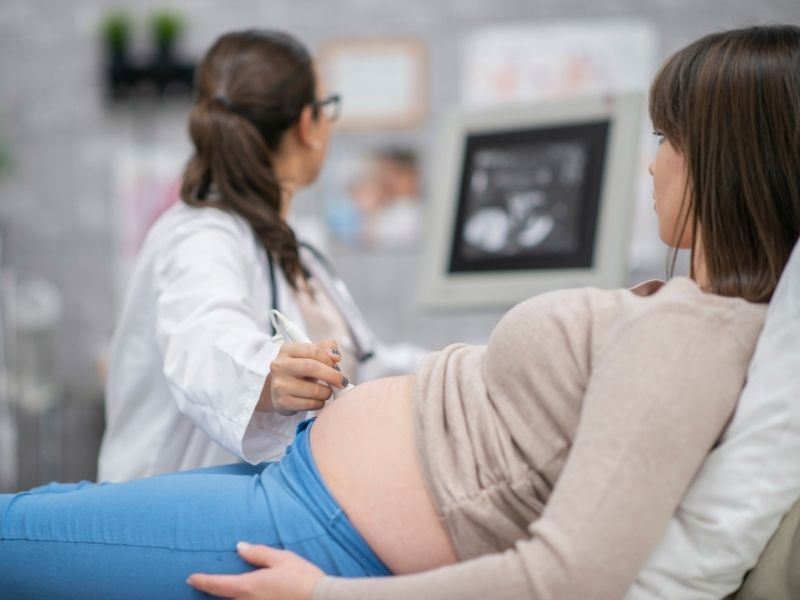Pregnancy follow-up is carried out from the beginning to the end of pregnancy. It is done to determine the gestational age, to learn the health status of the mother and baby, and to create a pregnancy plan. During this period, detailed controls are carried out to see if there are any problems in informing the mother and father-to-be.
All problems that may arise during pregnancy are controlled and problems that may arise are prevented in advance. Regular controls prevent problems in the health of the mother and baby.
What is Pregnancy Follow up?
What is pregnancy follow up? The purpose of follow-up is to protect the health of mother and fetus (baby in uterus) during pregnancy. It is carried out so that the baby is born in the healthiest way possible. Pregnancy follow-up begins as soon as the mother-to-be is diagnosed with pregnancy. About 2 weeks after the diagnosis, the gestational sac can be seen with ultrasound.
It is checked whether the baby is in the sac and the possibility of an ectopic pregnancy is checked. In addition, the baby's heartbeat is also listened during these controls. It is checked for any abnormality. In addition, the general health status of the mother is checked by applying certain blood tests and urine tests.
How to do Pregnancy Follow up?
How is pregnancy follow-up done? Every pregnant woman has certain check-ups during her pregnancy. All of the controls made from the beginning of the pregnancy to the end are called pregnancy follow-up. First, pregnancy planning is done. After planning, regular controls are started to be carried out.
The general health status of the expectant mother and baby is checked regularly and it is checked whether any problems occur. However, some blood tests are applied, urine tests are done and the baby's heartbeat is checked. In this way, the state of health of the expectant mother and baby is checked.
The inside of the gestational sac can be visualized in the first 4 or 5 weeks. In this way, it is understood whether the baby is in the uterus and in the the gestational sac or not. It is determined whether there is an ectopic pregnancy risk. Measures are taken for problems that have occurred or may occur in health. Possible problems are detected early and a treatment is applied for them.
When is Pregnancy Follow-up Performed?
When is pregnancy follow-up done? Pregnancy follow-up starts from the first moment of pregnancy diagnosis. This process continues until the end of pregnancy. In addition, during the follow-up, both ultrasound controls are carried out and certain tests are applied. As a result of all these, it is aimed that the mother and baby continue their lives in the healthiest way possible. By checking every detail, all possible problems are noticed early and precautions can be taken for this.
Week by Week Pregnancy Follow Up
During the week-by-week pregnancy follow-up process, the baby is constantly developing. Along with the development of the baby, it is also monitored with regular controls whether any problems occur. Thus, it is aimed for the baby to be born in the healthiest way. The baby develops in every week of the gestation period, which has a 37-41 week process. Therefore, it is necessary to check how the development progresses.
Inthe first trimester, the embryo grows rapidly and its organs begin to form. Inthe second trimester, the baby starts to move, the abdomen expands and becomes more prominent in the womb. During the same period, the expectant mother's energy increases and often unpleasant symptoms decrease. In the third trimester, the baby grows larger, moves less in the womb and the mother can get tired quickly because there is less space in the womb. At the same time, there may be oedema and weight gain in various body parts. The period of pregnancy can be different for each woman, but in general these changes follow a clear progression throughout the entire pregnancy.
Week by Week Pregnancy Symptoms
Pregnancy involves many symptoms and changes as it progresses week by week. In the first few weeks, women often experience a delayed period and some may notice light bleeding or spotting. In the second week, some women may feel breast tenderness and fullness. From the third week onwards, typical pregnancy symptoms such as nausea and tiredness may appear. In the fourth week, the pregnancy test may be positive and the pregnancy is now confirmed. In the fifth week, some women may complain of morning sickness. From the sixth week onwards, the expectant mother may notice enlargement of the uterus and breasts. As the weeks progress, the baby's movements become noticeable and the abdomen becomes more prominent as the womb grows. Each woman may have different experiences, but in general, the pregnancy symptoms week by week clearly show the changes during pregnancy.
1-4 Weeks of Pregnancy
In the first 4 weeks of pregnancy, fertilisation and implantation usually take place. During this period, women often experience a delay in menstruation and pregnancy tests may give positive results. Some women may notice light bleeding or spotting. Hormonal changes begin in the body and some mums-to-be may experience breast tenderness or fullness. At this stage, some women may experience mild nausea, tiredness and mild cramp-like pains. In the first 4 weeks, the embryo cells begin to divide rapidly, but the expectant mother usually does not feel any major changes yet. During this period, it is important that the expectant mother takes care with her diet and has regular check-ups with her doctor, as the baby's basic organs are already forming at this early stage.
5-8 Weeks of Pregnancy
Between the 5th and 8th week of pregnancy, there are important changes in pregnancy. The baby's organs develop rapidly during this period and the heartbeat becomes audible. The expectant mother may experience symptoms such as morning sickness and nausea more intensely. Breast enlargement and tenderness may increase and darkening of the nipples may occur. During this period, fatigue and weakness are common, and emotional fluctuations may occur due to changes in hormones. The expectant mother may also have digestive system problems such as urinary urgency, frequent need to go to the toilet and indigestion. During this period, while the baby's brain and spinal cord development accelerates, it is important for the expectant mother to eat healthy, not to interrupt the doctor's controls and to follow the pregnancy process carefully.
9-12 Weeks of Pregnancy
Between the 9th and 12th week of pregnancy, the important changes in pregnancy continue. The baby changes from an embryo to a foetus, its organs develop rapidly and its fingers and feet become more prominent. Expansion in the abdomen of the expectant mother increases, and there may be problems with clothing. Breast tenderness increases and the nipples may become darker. While fatigue and weakness continue, morning sickness and nausea may decrease but may still persist in some expectant mothers. During this period, skin blemishes and acne problems may occur. Emotional fluctuations may continue and some women may be more distressed and emotional due to the effect of pregnancy hormones. As the baby's brain development accelerates, it is important for the expectant mother to take care to eat a healthy diet and monitor the pregnancy process with regular check-ups.
13-16 Weeks of Pregnancy
Between the 13th and 16th week of pregnancy, some symptoms of pregnancy are alleviated while others persist. During this period, expectant mothers usually get rid of morning sickness and nausea decreases. The energy level increases and the feeling of tiredness decreases. The baby's organs are now more developed and some of them begin to function. The mum-to-be's abdomen becomes more prominent and the pregnancy becomes visible. Breast tenderness may persist and the nipples may darken and enlarge. Due to hormones, the skin becomes brighter, but acne problems may still persist. During this period, the sex of the baby can be determined by ultrasound. The expectant mother should continue regular medical check-ups, take care to eat a healthy diet and exercise.
17-20 Weeks of Pregnancy
Between the first 17th and 20th week of pregnancy, many changes and symptoms can be observed in the expectant mother. The baby's growth accelerates and you can now feel distinct movements in the womb. The abdomen gradually enlarges and the pregnancy becomes more pronounced. The breasts may continue to be tender and enlarged, and the nipples may change colour. During this period, the expectant mother may experience an increase in body weight and may experience back pain. The digestive system may slow down and constipation may occur. As the second trimester begins, morning sickness usually subsides, energy levels increase and emotional fluctuations ease. At this stage, the baby's development is monitored by ultrasound and it is important to take care of the pregnancy process for a healthy pregnancy.
21-24 Weeks of Pregnancy
Between the first 21 and 24 weeks of pregnancy, the expectant mother and her baby experience significant changes. The baby's movements become more pronounced and can be felt regularly in the womb. During this period, the belly of the expectant mother becomes more prominent and stretch marks may appear on the skin of the abdomen. The breasts are still growing and the milk glands are more active. Due to the rapid growth of the baby, the expectant mother may experience back and lower back pain. The digestive system continues to work slowly and constipation may persist. In addition, the expectant mother may experience some discomfort such as heart palpitations, nosebleeds and swelling of the feet. In this period, regular medical check-ups, healthy diet, regular exercise and good pregnancy follow-up are important.


25-28 Weeks of Pregnancy
Between the first 25 and 28 weeks of pregnancy, a number of symptoms and changes are observed in the expectant mother and her baby. During this period, the baby continues to grow rapidly and stronger movements are felt in the womb. At this stage, the expectant mother's abdomen expands considerably and weight gain continues. Breast tenderness and growth may continue. The digestive system continues to slow down and digestive problems such as heartburn and indigestion may persist. The expectant mother may need to go to the toilet frequently and may have constipation problems. During this period, weakness and fatigue may continue. In addition, discomforts such as swelling, varicose veins and cramps in the legs and feet may be common. Healthy nutrition, regular exercise and doctor controls are important during pregnancy.
29-32 Weeks of Pregnancy
Between the first 29 weeks and the 32nd week of pregnancy, the expectant mother and her baby experience a series of symptoms and changes. The baby continues to grow rapidly during this period and although there is less room for movement in the womb, regular movements can still be felt. The expectant mother may experience frequent urge to urinate due to the increasing size of the uterus. The skin on the abdomen continues to stretch and stretch marks may appear. Breast tenderness may continue and the milk glands may become more active. Hip and lower back pain may be common during this period. The digestive system continues to slow down and problems such as constipation and heartburn may persist. The expectant mother may often experience breathing difficulties and weakness. A healthy diet, regular exercise, regular medical check-ups and close monitoring of the pregnancy process are important.
33-36 Weeks of Pregnancy
Between the first 33 weeks and the 36th week of pregnancy, the expectant mother and her baby experience some symptoms and changes. The baby continues to grow rapidly during this period and although there is less room for movement in the uterus, regular movements can still be felt. The expectant mother may often experience digestive problems such as heartburn and indigestion. Tension in the abdomen increases and stretch marks may become more pronounced. The breasts continue to be tender and enlarged, and milk-like discharge from the nipples may appear. At this stage, lower back and back pain may be common and insomnia may be common. The expectant mother may feel the need to go to the toilet more frequently. During this period, prenatal preparations gain importance and regular medical check-ups continue. A healthy diet, regular exercise and preparation for labour are important at this stage of pregnancy.
37-40 Weeks of Pregnancy
Between the first 37 weeks and the 40th week of pregnancy, the expectant mother and her baby show signs and changes that the birth is approaching. The baby is now fully developed and ready for birth. During this period, the expectant mother may feel more discomfort due to the growth of the uterus and the need to urinate more frequently. Skin stretching and stretch marks on the abdomen may increase. Milk-like discharge from the mammary glands may be more frequent and the nipples may swell slightly in preparation for labour. As labour approaches, the expectant mother may feel pressure and pain in the pelvic area. Braxton-Hicks contractions, which are frequent and regular contractions, are common during this period. The expectant mother may often feel tired and weak and experience insomnia. In this period when the birth is approaching, it is important to make birth planning and follow the doctor's recommendations.
Prenatal Preparations
In the period before the birth, it is important that the expectant mother is prepared for the birth. First of all, birth planning should be done and the place of birth should be chosen. A trained birth coach or team support can be obtained. Hospital bags, items to be used during and after birth should be prepared. Relaxation techniques to be used in labour should be learned and birth preparation courses can be attended. At the same time, information about postnatal baby care should be obtained and necessary items for the baby should be provided. Appropriate nutrition and exercise routine should be maintained during and after birth, and the doctor's recommendations should be followed. Family and close neighbourhood support is also an important factor. Being in a comfortable and safe environment during labour is important for the health of the expectant mother and the baby.
Week by Week Pregnancy Checks
Week-by-week check-ups during pregnancy are important for regular monitoring of the health of mother and baby. Usually, the first examination with a gynaecologist or obstetrician is carried out immediately after a positive pregnancy test. Afterwards, regular check-ups are carried out every month, while from the 28th week onwards, the frequency increases to two and checks are carried out once a week. These check-ups include ultrasound, urine and blood tests, growth and development of the baby, blood pressure, weight monitoring and general health status of the expectant mother. Checks during pregnancy are vital for early detection of problems and intervention when necessary.
Pregnancy Follow up by Month
Thanks to the pregnancy follow-up by month, attention is paid to whether there is a problem in the development of the baby. Detailed tests and imaging methods are applied to determine whether the development is normal or abnormal.
In cases where it is abnormal, the necessary interventions are carried out and the health of the mother and baby is taken under control. These controls, which should be done regularly, are of great importance during the pregnancy process.
What are the tests performed in pregnancy follow-up?
What are the tests performed during pregnancy follow-up? Routine tests that should be performed during pregnancy are listed as follows:
- Ultrasonography
- Blood group determination
- Complete blood count
- Blood biochemistry
- Torch scan
- Complete urinalysis
- Pap smear test
- Hepatitis B, Hepatitis C, Aids Screening
- Thyroid function test
Vaccinations Desired During Pregnancy
Vaccines are a preventive treatment used to protect a person's immune system against an infection. Vaccines contain a weakened form of that virus. Therefore, it is important for the health of the baby and the mother to have the necessary vaccinations before pregnancy. Some vaccines may need to be given during pregnancy.
Vaccinations during pregnancy have two purposes. The first is to protect the mother against possible infectious diseases and the second is to ensure that the baby is protected against these diseases in the period immediately after birth.
Infections during pregnancy can have negative effects on the health of the mother and the baby. In particular, high fever and severe infections can be dangerous for the baby. High fever can cause birth defects in the baby and severe infections can increase the risk of premature birth. Therefore, the vaccines required to be done during pregnancy should be administered when recommended by your doctor.
Flu Vaccine
The flu vaccine is recommended during pregnancy. Pregnant women are at a higher risk than with normal flu. Flu can seriously affect the health of the mother and baby. Women who get flu during pregnancy have a higher risk of more serious health problems, such as pneumonia or other complications.
Flu vaccination during pregnancy protects the mother from flu during pregnancy and protects the baby from flu for the first 6 months after birth. Flu vaccination can be done at a suitable period during pregnancy by following the doctor's recommendations. Generally, flu vaccination is given after the first 3 months of pregnancy.
Tetanus Vaccine
Tetanus vaccine is a vaccine that can be safely administered during pregnancy as it does not contain live microorganisms. The antibodies formed by the tetanus vaccination of the expectant mother also pass to the baby. The baby is protected against any tetanus in the newborn period. The baby is then vaccinated against tetanus, diphtheria and whooping cough.
Although tetanus vaccine can be given at any stage of pregnancy, it is preferably given after the end of the 3rd month of pregnancy. If tetanus vaccination has not been completed within 10 years, it may not be necessary to do it again.
Hepatitis B vaccine
Hepatitis B vaccine is a vaccine that pregnant women at high risk should have. Hepatitis B vaccine does not contain a live virus. Hepatitis B virus is an infection that can cause serious damage to the liver. This infection can be transmitted to the baby through the parents or through blood and body fluids. Therefore, hepatitis B vaccination reduces the risk of infection in the days after birth.
The hepatitis B vaccine is usually given in three doses. The first dose is usually given during pregnancy and the other doses are given at postnatal visits to the doctor.
Are There Any Vitamins That Should Be Started When You Have Learned That You Are Pregnant?
From the moment they learn about their pregnancy, 400 micrograms of folic acid per day is recommended for all pregnant women and even women who are planning a pregnancy before they become pregnant.
The Most Common Discomforts During Pregnancy
We can answer the question of what kind of discomfort occurs during pregnancy with the following items;
- Reflux and similar stomach problems
- Constipation and haemorrhoids
- Frequent urination or incontinence
- Urinary Tract Infections
- Gestational diabetes or gestational diabetes
- Shortness of breath and breathing problems
- Pruritic urticarial papules and plaques (a skin disease that causes a rash on the skin)
- Cramps, numbness and tingling in the muscles
- Retaining more oedema than usual
- Depression during pregnancy
- Flu infections and sinusitis during pregnancy
- Infections such as vaginal discharge and fungus during pregnancy
- Foot swelling during pregnancy
- Spotting on the face and skin areas during pregnancy
- Goitre (thyroid) disease
- Albumin disease
What should be done to avoid infection during pregnancy?
In order to protect against infection during pregnancy, at least 2 and a half litres of water consumption and freshly squeezed fruit juice can be consumed every day. Especially packaged and sugary drinks should be avoided. Since the increased susceptibility to infection during pregnancy is related to the immune system, it is also recommended to pay attention to nutrition.
What are the Complaints During Pregnancy?
Among the complaints seen during pregnancy are nausea and vomiting in the morning, increased saliva secretion, more frequent urination than normal, incontinence, especially in the last months, muscle pain such as waist and back, head and abdominal pain, stomach problems, cramps and varicose veins (especially in the legs), edema in the hands and feet, bloating and constipation. In addition, sleep problems, nosebleeds, hand and foot numbness, itching in various parts of the body, gestational diabetes / poisoning, weight gain, waist thickening, stretch marks on the body, hair loss, skin problems, allergic problems, dental and gum problems, vaginal bleeding or discharge, swelling and similar changes in the breasts and sexual problems can also be seen. Apart from all these physical problems during pregnancy, the expectant mother may also experience psychological problems such as fatigue, depression, panic attacks, forgetfulness, difficulty concentrating, depressive moods and crying attacks.
Dangerous Diseases Affecting Pregnancy
Diseases that may occur during pregnancy can cause dangerous consequences that can harm the baby and the expectant mother. For this reason, it is recommended that people with chronic diseases or those who are suspected of having chronic diseases should definitely have a medical check-up before pregnancy. By having a general examination during your pregnancy planning period, you can protect the health of both you and your baby; you can find out whether your body is ready for pregnancy.
The answer to the question of which diseases are dangerous during pregnancy can be given as follows;
- Chronic high blood pressure (hypertension)
- Diabetes (Diabetes)
- Neurological diseases
- Liver diseases
- Thyroid Disorders
- Heart diseases
- Lung and respiratory diseases,
- Kidney problems and urinary tract disorders
- Diseases affecting the gastrointestinal system
- Blood disorders
- Infectious diseases such as rubella
- Rheumatic diseases
- Epilepsy (epilepsy)
- Mumps disease
- Chickenpox
- Measles
It is not true in line with scientific data. Except for the last month, a pregnant woman can have sexual intercourse at any time unless her doctor tells her otherwise. Those diagnosed with placenta previa (when the baby's mate closes the cervix) *If the pregnant woman is psychologically and emotionally afraid and does not want to have intercourse, she should be met with understanding and love and should not be forced. *Sexuality can also be experienced outside the vagina-penis relationship (such as partnerbation, masturbation ...). Most of the miscarriages in the first 3 months are caused by anomalies in the baby, not sexual intercourse. In the light of scientific data, it has not been proven to be harmful. Only in the last months, there are doubts that giving nipple stimulation may initiate premature birth. No, there is no known harm, but intercourse is not recommended after the 6th month of pregnancy in terms of premature birth. Pregnant women should have sexual intercourse in a position where they feel comfortable. The missionary position will not be suitable due to the growing abdomen in the following weeks. The position where the woman is on top or the positions where the man passes behind the woman seem to be more suitable. Postpartum is the puerperium period until the 6th week after birth, lahusa bleeding, which we call leucorrhoea, can be seen. The most important thing is the period when you are physically and emotionally ready for intercourse. Sexual intercourse does not only mean sex, you can try other ways of getting pleasure in this period. If your wounds have healed in normal birth and your bleeding has stopped, sexual intercourse can be experienced after the 3rd week, but the ideal is to have sex after the 6th week. **Milk protects, I'm breastfeeding anyway, don't be comfortable!!! Nevertheless, I recommend you to use a contraceptive method that you will choose with the guidance of your doctor in this process.Is it true that sexual intercourse can cause disability or harm the baby?
Who should not have sexual intercourse during pregnancy?
Does sexual intercourse cause miscarriage?
Can Pregnant Women Have Orgasm? Are contractions harmful to the baby?
Is intercourse harmful in twin pregnancy?
In which position should pregnant women have sexual intercourse?
When is sexual intercourse allowed after birth?






